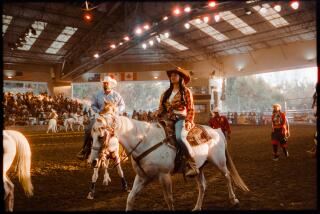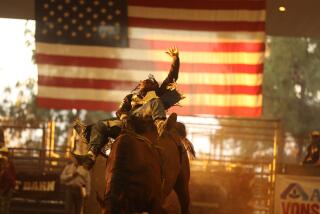Rhymin’ Roundup : The new style of cowboy poetry will be in the spotlight this weekend in Santa Clarita.
If your notion of a poet is Wallace Stevens or James Merrill, you may approach a gathering of cowboy poets with some trepidation. What if some buckaroo bard decides to rhyme riata with frittata or boot with Newt ?
Chatsworth writer Catherine Dain remembers her first visit to the mother of all cowboy poetry fests, the 10-year-old gathering held in Elko, Nev., every January. Like many other urbanites, Dain didn’t know what to expect when she signed up for a week of tumbleweed verse at near-Arctic temperatures.
Dain was so surprised by her first taste of cowboy poetry that she wrote her response into her 1994 novel “Lament for a Dead Cowboy” (Berkley): “I think I sat for 45 minutes without breathing, jaw dropped, eyes wide. Emily Dickinson said you know it’s poetry when it takes the top of your head off. I was glad I had a hat so nobody could see what happened to mine.”
Santa Clarita’s second annual Cowboy Poetry and Music Festival opens today at Melody Ranch and continues through Sunday. All the performance events, including the poetry readings and Saturday night’s Ian Tyson concert, have been sold out for weeks. The only event still open to the public is the weekend-long Cowboy Gear Show, where visitors will find books of cowboy poetry as well as handmade boots, custom saddles, Western art and other Western-themed objects.
Historians will tell you that cowboy poetry is a tradition as old as the West, that ranch hands and other cowboys have been entertaining each other with verse, songs and tall tales at least since the 1880s. According to Hal Cannon, the artistic director of the Western Folklife Center in Elko and the father of the current Roundup Renaissance, poetry quickly became the medium of choice around the campfire because reciting one’s work was less embarrassing than trying to warble it.
But the truth is that the new cowboy poetry is as much a 20th Century phenomenon as the spaghetti Western. Cowboy poetry only became a growth industry in 1985 with the founding of the Elko festival, which now draws 10,000 people. There are as many as 150 other gatherings devoted to the subject now held throughout the West. And such prominent cowboy poets as Waddie Mitchell, who will open the Santa Clarita festivities tonight and appear Saturday as well, suddenly find themselves with agents and invitations from institutions as disparate as the Smithsonian and “The Tonight Show.”
Many academics dismiss cowboy poetry as an oxymoron. A good deal of it rhymes, after all. And, as writer Edward Hoagland points out, cowboy poetry tends to be about “riding hard, punching cows, making a fool of oneself, and the ache of being poor in old age, when ‘memory replaces hope,’ in (classic cowboy poet) Bruce Kiskaddon’s phrase.”
But the cowboy poets don’t seem to care much if snide “civilians,” as poet Buck Ramsey calls them, don’t like the work. And the poets will tell you, one after another, that cowboy verse, taken as a whole, has a single grand theme. As poet Linda Hussa writes in an anthology called “Between Earth and Sky: Poets of the Cowboy West” (W.W. Norton, 1995): “There is a core in cowboy poetry, twisted strong like rawhide, and that is love of the land. Above all, that. All life centers around the land.”
A Texas poet and musician on the Santa Clarita bill, Ramsey is as big in his field as Sheryl Crow is in hers. Like most of the others on the poetry circuit, he earned his spurs as a working cowboy. In a wheelchair since he was thrown from a horse some 30 years ago, Ramsey has stayed close to his ranch roots. A longtime collector of classic cowboy verse and songs, he began writing his own poems six years ago after a visit to Elko, an experience he calls “sorta like a thirsty man finding a spring.”
Ramsey is not surprised that cowboy poetry readings sell out. “The cowboy story or cowboy epic is the one mythology America has given to the world,” he notes. “There’s something kinda purifying about it,” he says of that mythology. And although he would never use a highfalutin word like quest to describe what he and his fellow poets are up to, he admits they are “trying to take the cowboy image away from Hollywood and New York and Nashville and make it what it’s supposed to be.” *
Women are among the poets who suddenly find their rural mailboxes full of requests from publishers who want to see more of their sometimes deceptively simple work. As one journalist noted, it’s a long way from the days when cowboy poets could get published only in aggie magazines filled with ads for bull semen. Virginia Bennett, who will read at Melody Ranch on Saturday, lives on a guest ranch in Twisp, Wash., in a county so sparsely populated that it has only one stoplight.
Bennett is from New Hampshire, but realized early that she “had been kind of born in the wrong place.” When other New England girls were playing field hockey, she was attracted to the rodeo, especially barrel racing. After high school, she hitchhiked to Arizona, where she met her husband Pete and began working at his side as a ranch hand.
“We started,” Bennett recalls, “from the ground up--milking the boss’s cow.” They now manage Twisp’s Tice Ranch, where her ability to articulate her vision of the West is valued as much as her skill at roping a steer.
“The thing that makes her good,” Pete says of his Western poet wife, ‘is that she lives it.” Originally self-published in volumes with such titles as “Rode Hard and Put Away Wet,” her poems deal with such gritty realities of ranch life as the deer that die of starvation most winters. During a recent interview, she mentioned that she and Pete had just come in from putting down a dying yearling they had tried and failed to save.
“We live with nature,” she says. “We live with death and life and with the landscape and with the weather. I’m just writing what I know.” And though she loves the ranch way of life, she also loves using words to share her experience with other people. One of her favorite compliments was from a reporter who told her after a reading: “You take us right up on the rimrock with you.” That, says Bennett, is what cowboy poets do.
*
Peggy Godfrey is another woman who can ride as well as she versifies. Appearing Saturday at Melody Ranch, Godfrey has been a ranch hand for 22 years, currently in Southern Colorado. Recently, she’s been up every night because her heifers are calving. “Heifers,” she explains, “are first-timers and if you don’t check them every two hours you’re in trouble.”
Godfrey would rather be on a ranch than anywhere else. “Ranch life is one of the few places where dirt’s dirt, truth’s truth, honesty’s honesty and people are people,” she says. “There’s not a lot of clutter.”
Between bovine obstetrical chores, Godfrey writes her often comic poetry. One recent ode compares her “almost ex-husband George” to his particularly troublesome steer. Their habits were very similar, she explains. Both man and beast were good inside but suffered from “always having his eye over the fence.’
(BEGIN TEXT OF INFOBOX / INFOGRAPHIC)
Western Wear and Works
All readings, concerts and other performance events at the city of Santa Clarita’s Second Annual Cowboy Poetry and Music Festival are sold out. The only event still open to the public is the free Cowboy Gear Show, featuring Western clothing, jewelry, art and other items, including the works of participating cowboy poets. There is no parking at Melody Ranch Motion Picture Studio, site of the festival. All parking is at William S. Hart High School, 24825 Newhall Ave., Santa Clarita. A free shuttle will take ticket holders and those attending the gear show to the ranch. The gear show begins tonight at 6 and continues until 10 p.m. Saturday’s hours are 10 a.m. to 8 p.m., Sunday from 10 a.m. to 4 p.m. For further information, call (800) 549-4515.
Words to Ride By
For time came we were punching cattle
For men who knew not spur nor saddle,
Who came with locusts in their purse
To scatter loose upon the earth.
The savage had not found this prairie
Till some who hired us came this way
To make the grasses pay and pay
For some raw greed no wise or wary
Regard for grass could satisfy.
The old ones wept and so did I.
--from “Anthem”
by Buck Ramsey
More to Read
Sign up for our Book Club newsletter
Get the latest news, events and more from the Los Angeles Times Book Club, and help us get L.A. reading and talking.
You may occasionally receive promotional content from the Los Angeles Times.









